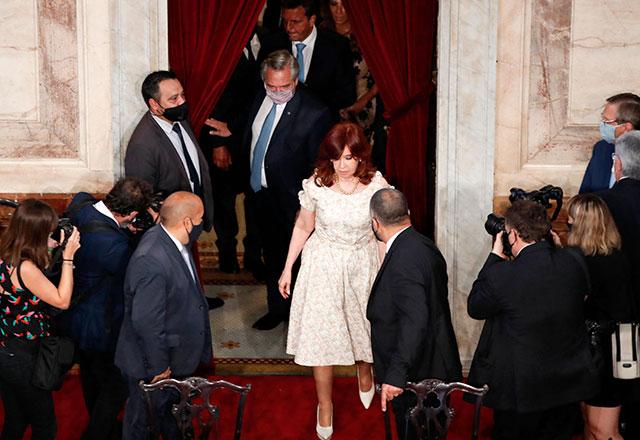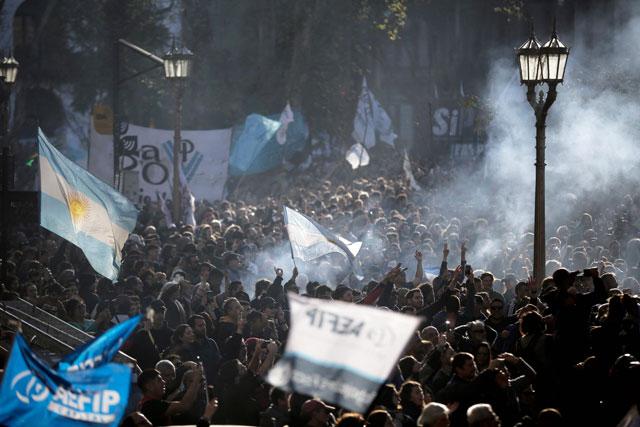You are here
Conservative Macri takes office in Argentina
By AFP - Dec 10,2015 - Last updated at Dec 10,2015

Argentina’s new President Mauricio Macri (centre) and Vice President-elect Marta Gabriela Michetti during their inauguration ceremony at the Congress in Buenos Aires on Thursday (AFP photo)
BUENOS AIRES — Business-friendly conservative Mauricio Macri was sworn in as Argentina's new president Thursday, turning the page on 12 years under left-wing power couple Nestor and Cristina Kirchner.
Kirchner and her allies in Congress boycotted the ceremony after a tiff over protocol escalated into a messy court battle, so the oath of office was administered by incoming Senate speaker Federico Pinedo, the acting president since midnight.
Macri, 56, laid out an agenda for sweeping change in his inaugural address.
"This government will know how to defend freedom, which is essential for democracy," he said.
He also promised to fight "tirelessly for those who need it most" — a nod to his campaign pledges to keep the Kirchners' popular social programmes.
His swearing-in marks the start of a new era for Argentina after three terms under the Kirchners, who led the country back to stability in the wake of an economic meltdown in 2001.
Macri has vowed to reboot Latin America's third-largest economy, which is slumping back toward recession, by ending protectionist import restrictions, cutting heavy taxes on agricultural exports and scrapping the official exchange rate puffing up the Argentine peso.
Kirchner, whose eight years in office were marked by her confrontational brand of politics and distaste for compromise, made her exit in characteristic style.
She rejected Macri's plans for inauguration day, insisting it was a waste of time to take the oath of office at Congress, then travel to the iconic presidential palace, the Casa Rosada, to receive the presidential sash and scepter.
Kirchner, 62, accused Macri of disrespecting her on the phone when they discussed the matter.
Determined to have his moment in the sun at the famous pink palace where iconic leaders like Juan and Eva Peron rallied the masses of yore, Macri took the matter to court, which ruled in his favor.
Kirchner, irate, announced she would not attend.
Perhaps seeking to smooth over the spat, Macri made an appeal for "unity" in his speech, before heading to the presidential palace, waving to crowds of cheering supporters from the sunroof of a white SUV.
Corporate Cabinet
Macri won a run-off election against Kirchner's chosen successor, Daniel Scioli, on November 22.
The son of a wealthy businessman, he rose to fame as the president of Argentina's most popular football club, Boca Juniors, during a storied string of trophy wins.
The twice-divorced father of four, who is married to a former model, had been Buenos Aires mayor since 2007.
He has stressed his pro-business credentials, naming a Cabinet with ministers from the ranks of companies like IBM, Shell, General Motors and Deutsche Bank.
His administration will be tasked with finding an exit from Argentina's drawn-out fight with American hedge funds that are demanding full repayment of debt that Buenos Aires defaulted on in 2001.
The US court battle has derailed the country's efforts to restructure its debt and left it cut off from global capital markets.
Political realignment?
His victory has political analysts talking about a possible "realignment" in Argentine politics.
Since the end of the country's 1976-1983 dictatorship, he is only the third leader elected from outside the "Peronist" movement founded by Juan Peron, the towering figure of 20th-century Argentina.
The other two failed to finish their terms — an unsettling reminder of the difficulties Macri could face in dealing with Peronist labour unions, governors and lawmakers.
His room for maneuver will be limited by Congress, where the Peronists will be the largest party in the lower house and have an absolute majority in the Senate.
But, in a sign of the right's new momentum, his ally Maria Eugenia Vidal took office Thursday as governor of the powerful province of Buenos Aires — the first time a non-Peronist has won the post in 28 years.
Across Latin America, there are signs that the left's political dominance over the past 15 years may be fading along with the region's erstwhile economic boom.
Macri's win in Argentina was followed by a resounding victory for the Venezuelan opposition in legislative elections, as well as the opening of impeachment proceedings against embattled Brazilian President Dilma Rousseff.
Related Articles
BUENOS AIRES — Conservative challenger Mauricio Macri turned Argentine politics on its head on Sunday, kicking the ruling Peronist movement
BUENOS AIRES — Argentina Vice-President Cristina Kirchner accused the judiciary of persecution as she appeared in court virtually on Thursd
BUENOS AIRES — Messages of shock and solidarity poured in from around the world on Friday after a man tried to shoot Argentine Vice Pre

















